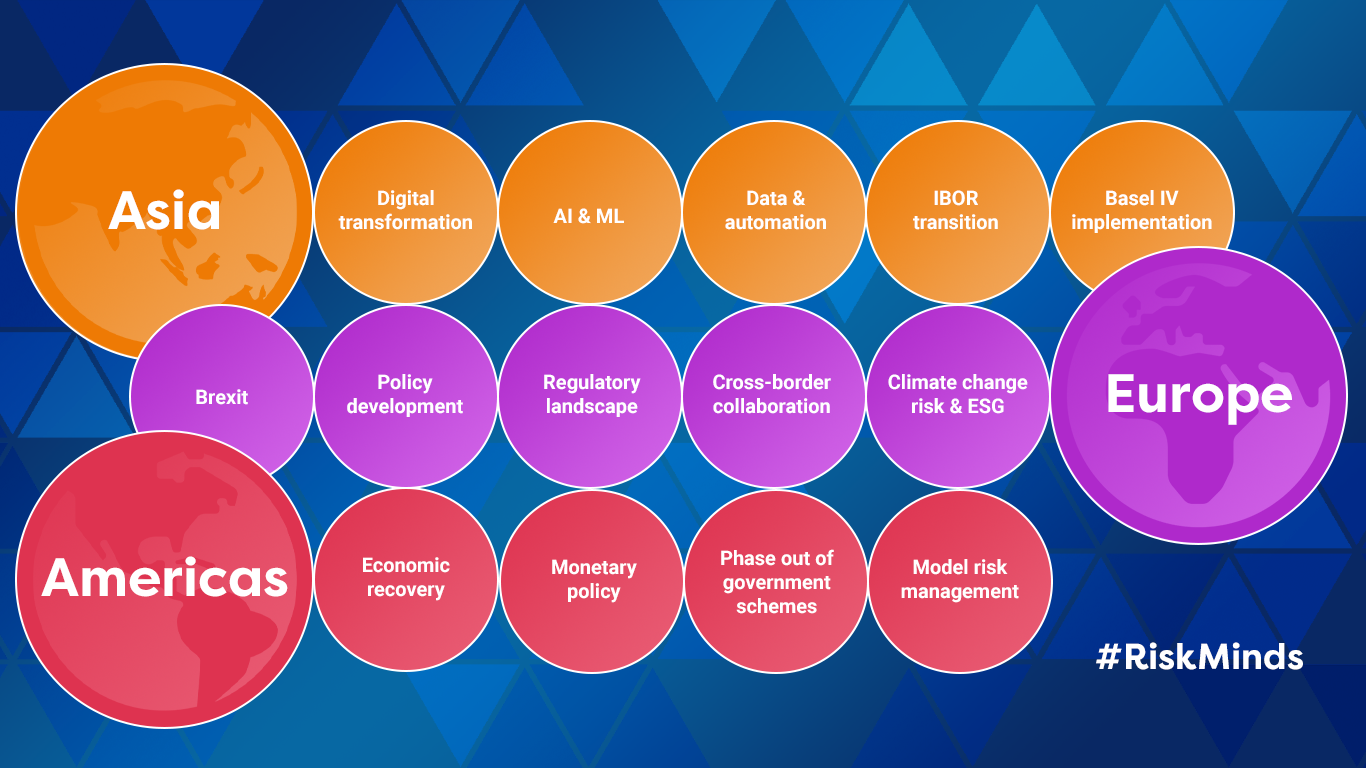Risk management challenges and opportunities around the world in 2021: Regional perspectives

With many key regulations coming into effect, the on-going disruption and economic fallout from the pandemic, the ticking time bomb of climate change risk, and mass digitalisation disrupting the industry like never before, it poses the question, has our risk profile changed?
Following extensive research with risk managers across Asia, Europe and the Americas, we have identified some of the key regional challenges and opportunities that is dominating the risk management industry at present.
RiskMinds Asia
In an ever-increasing competitive landscape, Asia-Pacific is the region that is revolutionising the financial services industry in line with digital developments. How risk management is evolving as a result to meet these new demands is talk of much debate amongst the industry. Understanding new operating models and the changing customer relationships brought about by digital banking is key for risk management in examining the opportunities to successfully operationalise digital transformation at speed, whilst mapping out the potential risks.
More specifically, Asia’s ecosystem has made significant strides in the artificial intelligence and machine learning agenda. However, how are risk managers effectively monitoring the explosion of automation, digitisation & data transformation in the financial services industry whilst keeping abreast with regulatory developments? The rest of the world is turning to Asia to better understand digital banking and how the likes of hugely successful payment apps such as Alibaba and WeChat have taken the industry by storm. The argument still remains, however, over how the traditional banking industry can either ‘challenge the challengers’ to fend off competition, versus how can we look to work together, adopt, and embrace this change.
Another key challenge for Asia is how the region is governing risk in an increasingly interconnected world. Identifying the fundamental differences across regions in managing regulatory fragmentation, operational challenges, and reporting standards is gaining a lot of traction in the industry at present, as pressure is mounting to keep pace with European and U.S. markets. IBOR transition and Basel IV implementation challenges across APAC are creating a lot of noise globally, as arguably, a lack of uniformed regulatory measures and clear strategy has meant slower progress across Asia with multiple approaches taking place. As such, how can Asia reach the same developmental stages as European and U.S. economies?
RiskMinds Europe
As the dust settles across Europe post-Brexit, there are many questions across the industry on what’s driving the status quo and how it is impacting risk management. The fallout of Brexit and what this now means to governance, policy development, and the regulatory landscape across Europe is causing a great deal of concern amongst risk professionals in the region. The industry is keen to better understand what the next steps are for the UK and Europe. As such, risk managers are eagerly waiting to hear further announcements from the regulators on how the regions can collaborate better to create more synergy cross-border.
One of the biggest topics for risk managers across the globe at present is the growing concern around climate change risk and ESG. With increased pressure from customers, governments, and corporations alike, what can the rest of the world learn from Europe? Europe has been making great strides in pushing forward this agenda, with the PRA’s comprehensive summer 2021 stress testing programme, outstanding policy work to be released from the European Commission, and the European Central Bank discussing what exposure banks have to ESG risk. With many high profile pledges and commitments announced this year across the financial services industry in facilitating the move to a low carbon economy, the challenge is now operationalising these commitments. What do boards, businesses, and risk managers need to know and act on in incorporating ESG and sustainability into the risk management agenda? What’s truly actionable and where do the limitations lie? These questions are dominating much of the discussion across Europe. As key financial disclosures, stress testing exercises and scenario analysis is gaining steam through 2021 across the region, there are many exciting developments being made.
RiskMinds Americas
Managing risk in the face of unprecedented societal and political upheaval, the fallout of Covid-19, along with a significantly fractured economy is keeping many risk officers across the Americas awake at night. There has been much discussion on the new Biden administration and what changes this may bring about to the economy, such as the US re-joining the Paris climate agreement deal, international relations, and the impact this will have on risk management. Monetary policy, credit risk, and defaults through 2021 and 2022 are dominating much of the discussion, specifically focusing on what the impact of the phase out of government schemes will be. As a result, the return of credit risk has very much been brought back into the limelight following the pandemic. Possible solutions to challenges around increasing transparency on the balance sheet and utilising the lessons learnt following the crisis are now being shared widely amongst risk managers.
Following on from lessons learnt from the pandemic, many risk managers across the Americas are keen to reassess their model risk management practices in concerns over whether their models are still fit for purpose. As the majority of models are based on the use of historical data, the crisis prompted risk managers to think about model risk in a different way. Consequently, there is much discussion around what risk practices and techniques are emerging in model risk management. For example, are risk managers moving further away from a linear type of model risk management? In addition to more mature risk model types and volatile market conditions, emerging risks including climate change risk, ESG, AI and automation/ digitalisation across the industry are further driving this momentum forward.



